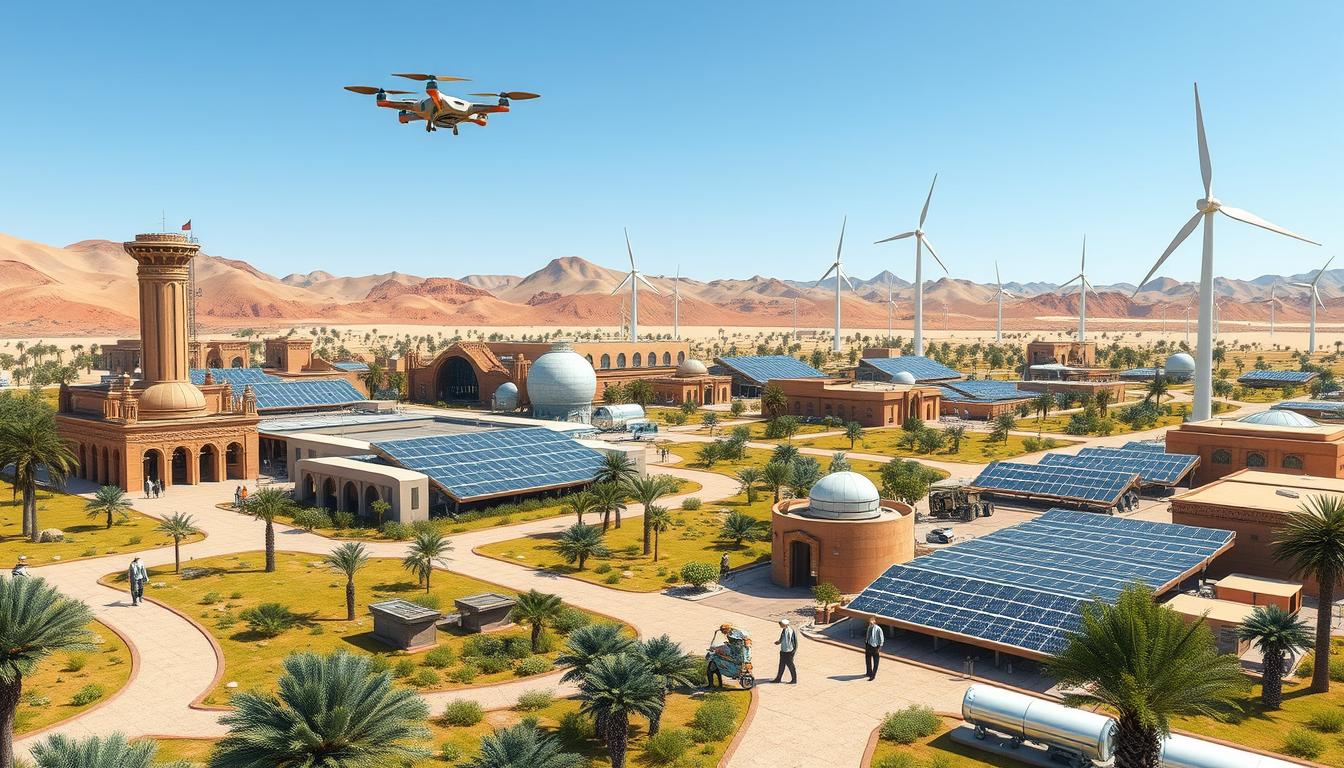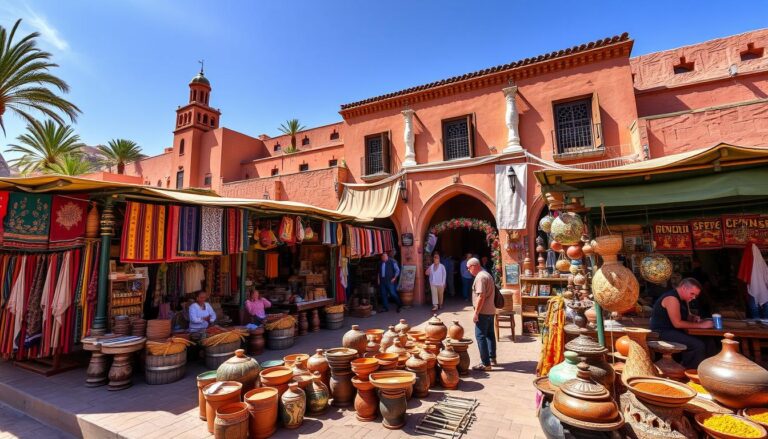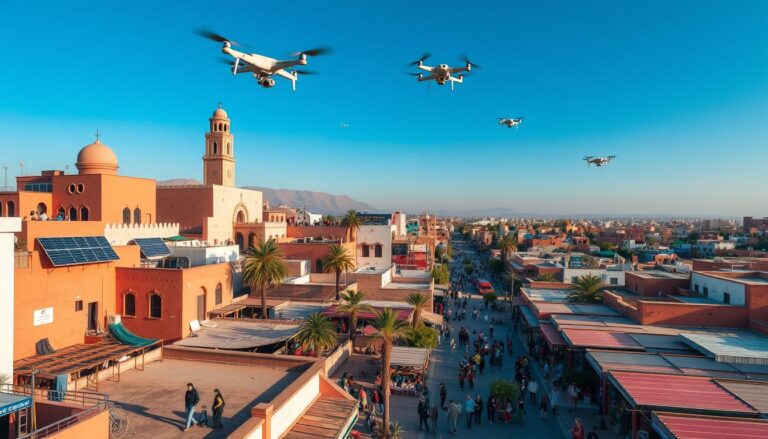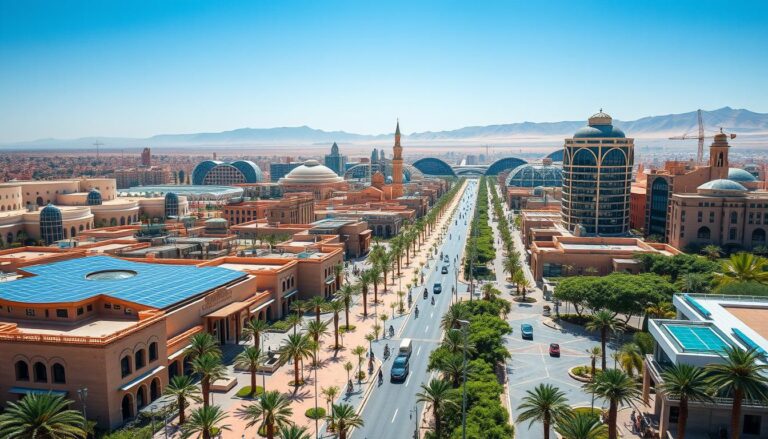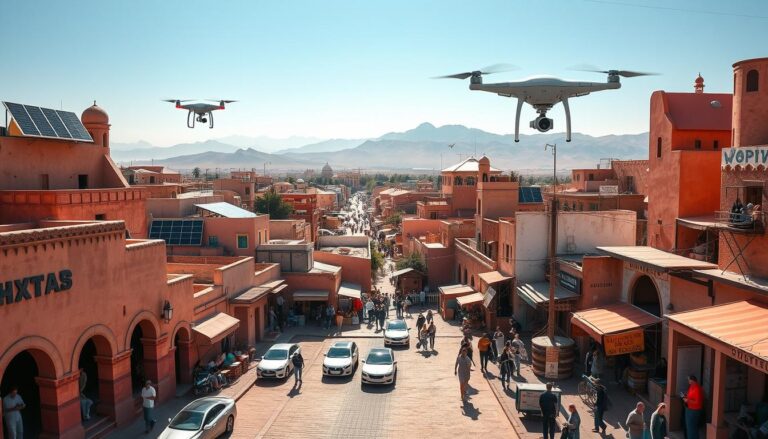What makes a nation a leader in technology and industry in today’s world?
Aïssa Christophe Agostini, an industry expert, says Morocco is a key player globally. It matches the world’s trend of changing value chains. Morocco’s smart industry is boosted by its location and trade deals, making it a hub for advanced tech and manufacturing.
Morocco is now a top spot for business, thanks to its tech growth. It’s a place where industry and technology meet, offering many chances for growth. Let’s explore how Morocco’s plans and location are changing the game in smart industry.
Introduction: Morocco’s Industrial and Technological Platform
Morocco is making a big name for itself in the world of industry. It’s using a strong Technological Platform and smart plans to modernize. The country is growing fast by using the latest in Industrial IoT and joining Global Value Chains.
Global Context and Value Chains
Morocco is playing a big role in global value chains. Its close location to Europe and growing trade deals help a lot. The Moroccan industry is known for its ability to adapt and succeed in these changing times.
Strategic Location and Trade Agreements
Morocco is at a key spot between Europe, Africa, and the Middle East. This makes it a great place for trade. Trade deals have made it easier for Morocco to reach out to the world. This has made it a favorite spot for foreign investors.
Opportunities for Industrial and Technological Development
The Moroccan industry is full of chances for growth, especially in tech. The government is putting more money into science and tech. It’s also starting programs to encourage new ideas, like the National Fund for Scientific Research and Technological Development.
Focus areas like renewable energy, agriculture, biomedicine, and cars are set to lead the way. Morocco is working hard to improve education and use Industrial IoT more. This will help it become a top player in innovation. Morocco’s plans promise not just economic growth but also lasting success worldwide.
Privileged Access to International Markets
Morocco has made big strides in getting into international markets. It has Free Trade Agreements with over 50 countries. This includes big players like the European Union, the United States, and many in the Middle East and Africa. These agreements have helped Morocco build strong trade ties worldwide.
Free Trade Agreements
One key deal for Morocco is with the United States. It has led to a huge jump in trade between the two. Agreements in Europe and the MENA region have also made things easier and cheaper for Moroccan businesses. The Tanger Free Zone is a great example, offering tax breaks and top-notch facilities at good prices.
Economic Openness and Market Integration
Morocco’s push for economic openness has been key to its growth. Deals like the U.S.-Morocco FTA have opened up more global markets. This has brought in more investments and helped the economy grow. In 2023, Morocco got over $10 billion in investments for new projects.
Morocco keeps working on its economic strategy. It’s setting up free zones and special areas, like the Tanger Free Zone. These places offer benefits like job help. They draw in a lot of foreign investment, especially in making things, which was 23.6% of FDI in 2021. Morocco’s focus on innovation and market integration keeps it competitive globally.
Geographical and Logistical Advantages
Morocco’s location at the crossroads of Europe and Africa boosts its economy. Its strategic spot makes it a key link between Europe, the Middle East, and Africa. This makes it easy to access important markets.
The Tanger-Med Port shows Morocco’s strong logistics. It’s close to Spain, making sea travel to Europe fast and cheap. The port’s work with Barcelona and Tanger-Med makes things even better.
Morocco’s car industry is a big part of its economy, making up almost a quarter of it in 2023. It’s Africa’s biggest car exporter. Morocco has a strong supply chain with 250 global players and SMEs, helping cars go to 75 places worldwide.
By 2025, Morocco aims to make one million cars a year. By 2030, it hopes to make two million. The Tanger-Med Port helps with this goal. Morocco also has low taxes and special zones for businesses, drawing in big car makers.
Spain and Morocco working together makes things better. Places like Tangiers-Tetouan-Al Hoceima have strong ties with Catalonia. This helps everyone compete better and creates jobs.
Improvements in Tangier, like better ports and schools, make it a great place for business. It also offers a good life for those who invest there.
Smart Factory Solutions: The Fez Smart Factory (FSF) Ecosystem
The Fez Smart Factory (FSF) Ecosystem is a big step for Morocco in Smart Factory Solutions. It aims to boost industrial productivity and drive innovation in making things. The first phase covers 8,014 m² across five levels, offering a modern industrial space.
FSF Competitions and Components
The FSF Ecosystem has activities and facilities to foster innovation and support startups. Key parts include:
- 4.0 Incubator
- Startup Accelerator 4.0, offering up to four years of support
- Engineering services for Industry 4.0
- R&D entities
- Rapid Prototyping Center
- Business Center 4.0
- Pilot Model Factory 4.0
Support for Innovation and R&D
The FSF Ecosystem is a hub for innovation in making things. It’s backed by research and development centers. The EuroMed University of Fes and the FONZID fund, with MCA-Morocco’s support, offer two years of free tech support and incubator fees for starting projects. This creates a strong base for R&D Support.
Incentives for Businesses and Investors
The FSF Ecosystem shows Morocco’s commitment to making Smart Factory Solutions attractive. The $30 million FONZID program and 50% funding from MCA-Morocco increase the benefits. Companies joining this ecosystem can see a productivity gain of over 25%, promising a bright future for Innovation in Manufacturing.
Promoting Smart Microgrids
Morocco is leading the way in Smart Microgrids, pushing its goal for more renewable energy. It wants to get 52% of its power from the sun, wind, and water by 2030. This focus on sustainability and saving energy is key.
Integration of Renewable Energy Sources
Morocco’s energy plan includes using more Renewable Energy Sources in smart microgrids. Teams from Moroccan universities are working on this. They aim to mix renewable energy with smart grid tech.
Energy Efficiency in Smart Buildings
Smart buildings in Morocco are getting better at saving energy. They use sensors and software to control energy use. This is important because buildings use 28% of the country’s electricity.
The Solar Decathlon Africa shows Morocco’s success in education and science. It’s a big step forward.
Impact on Energy Consumption and Sustainability
Smart Microgrids are making a big difference. For example, a microgrid testbed at Alakhawayn University is helping researchers. It’s all about making Morocco more sustainable and resilient to climate change.
These projects also support green energy for different types of buildings. They’re all about a sustainable future.
Automation and Industry 4.0 in Morocco
Morocco is moving fast towards a new industrial era with automation and Industry 4.0. The Competence Center for Automation in Morocco (CCoA) is key. It helps connect Moroccan talents, start-ups, and big companies from Germany through events and programs.
Important events like the online seminar on December 13, 2022, and the matchmaking event on February 7, 2023, helped Moroccan companies team up with German ones. The Biz-Fit Launch Event on February 16, 2023, was a big chance for Moroccan businesses to talk and share ideas.
The Morocco 4.0 event on February 21-22, 2023, was a big deal. It had Makeathon, job swaps, and workshops on employer branding. These activities were all about making Morocco’s industry more digital and keeping up with the world.
“The Young Talents in Automation Award recognized outstanding projects by students from Moroccan universities and vocational schools, reflecting the country’s commitment to nurturing skilled workers in the manufacturing sector.” — CCoA Report
The CCoA runs training in areas like automotive, agriculture, and food processing. This is to create more jobs. A CCoA survey shows that better automation and digital tools are key for Moroccan industries to grow and be more productive.
Studies have looked into how Industry 4.0 helps with sustainable growth and productivity. For example, a 2017 study by Bakkari and Khatory showed how new manufacturing tech can help Moroccan SMEs grow sustainably.
Reports by Mokri in 2016 and by McKinsey & Company and The World Bank show Morocco’s path to a digital, automated industry. It’s a journey filled with promise and well-planned steps.
In short, Morocco’s push for Automation in Morocco through Industry 4.0 is crucial. By using the latest tech and working with other countries, Morocco is set to change its industry. It will fit right in with today’s Moroccan industry trends.
The Role of Moroccan Government in Innovation
The Moroccan government has been key in boosting innovation. They have set up Government Innovation Policies and focused on Public-Private Partnerships. These efforts have led to big steps forward in areas like renewable energy and digital change.
National Policies and Investments
The government has made big investments in innovation. For example, they doubled funding for clean energy research from €40 million to €80 million. This shows their goal to be a leader in solar, wind, and hydro energy.
By 2030, Morocco wants 52% of its power to come from renewable sources. They aim for 20% from solar and 20% from wind. This plan is to cut greenhouse gas emissions by 17% by 2030.
Partnerships Between Universities and Industries
The government has helped universities and industries work together. This is key for moving forward in new technologies. Projects with the Institute for Research in Solar Energy and New Energies (IRESEN) have led to new products and jobs.
The Digital Development Agency (ADD) is working on a digital strategy for 2020-2025. It aims to boost digital innovation and inclusion. Working with international partners and the private sector is crucial for these goals.
Competitive Economic Zones and Incentives
Morocco has set up special economic zones to draw in foreign investors. Places like the Tanger Free Zone offer competitive incentives to businesses worldwide. This strategy has been very successful.
In 2021, Morocco became the ninth biggest recipient of foreign direct investment (FDI) in Africa. The country saw a 52% jump in FDI to $2.2 billion. This shows Morocco’s growing role in global investment.
France, the United Arab Emirates, and Spain are the main investors in Morocco. Their money is fueling the country’s industrial growth.
The manufacturing sector in Morocco is getting the most FDI. Real estate, telecommunications, tourism, and energy and mining also see big investments. A Free Trade Agreement with the United States has greatly boosted trade between the two countries.
The economic zones in Morocco offer many competitive incentives. These include:
- Tax exemptions and reductions.
- Employment subsidies for certain industries.
- Infrastructure at competitive rates, tailored to industry needs.
Tanger Med, the biggest shipping port in Africa and the Mediterranean, shows Morocco’s focus on infrastructure. The port plans to grow its capacity to support up to five million TEUs. This will improve logistics and trade.
Morocco’s location at the crossroads of Africa, Europe, and the Middle East makes it attractive for foreign investment attraction. The country’s efforts to make business-friendly through competitive incentives keep it a top choice for investors.
Conclusion
Morocco is making big strides in becoming a leader in smart industry growth and sustainable development. This is thanks to smart decisions and strong plans. The country is becoming a key hub for industrial transformation, thanks to trade deals and a welcoming environment for investors.
More than half of Moroccan companies are seeing their sales stay the same or grow thanks to new technologies. This shows how Morocco is moving forward with Industry 4.0.
The journey from old to new industries is clear. We started with steam power, then moved to mass production, and now to advanced automation. This shift has made things more efficient and allowed for riskier tasks.
Despite some challenges, like high costs and a lack of skilled workers, Morocco is determined to keep moving forward. This is part of its plan to transform its industry.
Initiatives like the Digital Morocco Plan and Maroc Digital 2020-2025 have made a big difference. They’ve helped make online services better, with more people able to access them remotely. The country aims to fully digitize its services by 2030.
Experts say investing in Morocco can lead to economic growth and a sustainable future. This shows Morocco’s commitment to being a leader in smart industry growth. The country is setting a great example for others to follow.
Source Links
- Bring Your Business to Morocco | Fez Smart Factory Competitions
- Promoting Smart Microgrids in Morocco
- Plans and priorities – Mission Innovation
- Science and technology in Morocco
- Microsoft Word – ejbmr_1892(galley).docx
- Morocco: The Next Industrial and Technological Hub 🇲🇦🇪🇺🇺🇸🇬🇧
- Morocco – United States Department of State
- Morocco emerging as key global production hub
- Morocco: improving logistics attracts investment and improves competitiveness
- Fez Smart Factory | UEMF
- Increasing Climate Resilience with Energy Efficient Microgrids
- Competence Center on Automation Morocco – CCoA
- Morocco’s Readiness to Industry 4.0
- Digital Transformation Center Morocco | BMZ Digital.Global
- Morocco – United States Department of State
- Spotlight on Morocco | GoGlobal
- Morocco – Investment Climate Statement
- 223.docx
- Morocco: The Impact of the Digitization of Public Services

The Editorial Team is a passionate group of Morocco enthusiasts dedicated to sharing the beauty, culture, and wonders of this captivating country. With diverse backgrounds and a deep love for travel, we strive to bring you engaging and informative content that inspires your Moroccan adventures. From uncovering hidden gems and sharing local insights to exploring mouthwatering cuisine and showcasing the vibrant lifestyle, our team is committed to providing you with valuable resources and exciting stories that enhance your exploration of Morocco. Join us on this journey as we celebrate the rich heritage and unforgettable experiences that make Morocco truly special.

